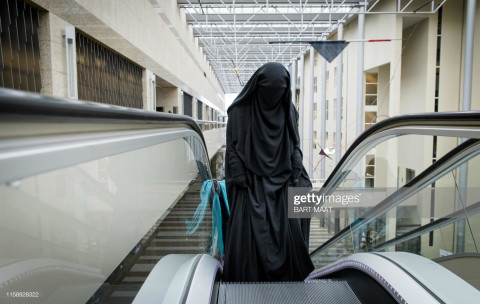
GCED Basic Search Form
Quick Search
Usted está aquí
Noticias

Human rights advocates are concerned that the Netherlands' burqa ban might stop Muslim women from entering public spaces, including schools.
The government announced on Thursday that burqas, niqab face-veils, motor helmets, and ski masks are all officially banned in public spaces. The law doesn’t apply to public streets but also includes hospitals, government buildings, and public transportation. Offenders are subject to a 150 euro ($166) fine.
The ban will affect an estimated 150 burqa and niqab-wearing women in the Netherlands, according to DW, and girls will be affected by the ban as early as middle school. The burqa is not mandatory for all Muslim women, but some choose to wear them once they have reached menstruating age.
Schools become unsafe environments when teachers or officials can target and punish students for expressing their beliefs, Philippe Nassif, advocacy director for the Middle East at Amnesty International, told Global Citizen. As a result, parents might be more inclined to keep their daughters at home because they could become targets for bullying or because they can’t practice their beliefs freely and fairly, he said.
In school, if a student refuses to abide by the dress code and is punished, it might make a scene; if they obey it, they can feel shamed publicly by their peers, Nassif explained.
“People have the right to exercise freedom of expression under international human rights law,” he said. “They have the right to express their religion and practice their beliefs freely without any kind of harassment or any kind of discrimination.”
Outlawing religious clothing hinders the economic and social integration of Muslim women, increases discrimination, and can place Muslim girls under psychological distress that disrupts their ability to perform at school.
Prominent Dutch officials, transportation officials, and health officials have all said they will not enforce the burqa ban, but the government has not shown signs of amending the law anytime soon.
Prime Minister of the Netherlands Mark Rutte’s coalition government passed the burqa ban in 2016 in response to the growing popularity of right-wing Paty for Freedom leader Geert Wilders, who opposes a dominant presence of Islam in the country, according to the Guardian.
Wilders told the Associated Press that the next step is to make sure that headscarves are also criminalized.
The Netherlands is the latest European country to introduce a ban on religious clothing in recent years following France, Germany, Belgium, Austria, and Denmark.
France’s ban has already proved to negatively impact Muslim girls' educations. After France enacted a headscarf ban, researchers found that the rate at which Muslim girls dropped out of school increased by 6%, and they took longer to complete secondary education. After the ban, they were also prone to have more children.
When Austria prohibited headscarves in schools in May, Shauna Pomerantz, associate professor in the Department of Child and Youth Studies at Brock University, condemned the law. Pomerantz, also the author of Girls, Style, and School Identities: Dressing the Part, told Global Citizen that bans on religious clothing lay the groundwork for hatred, fear, and racism, while teaching young people that differences are bad and Muslim girls are dangerous.
The Dutch government insists the ban doesn’t target any religion and that people are free to dress as they want, and will evaluate the law after three years.
URL:
https://www.globalcitizen.org/en/content/netherlands-enforces-burqa-ban-public-schools/
